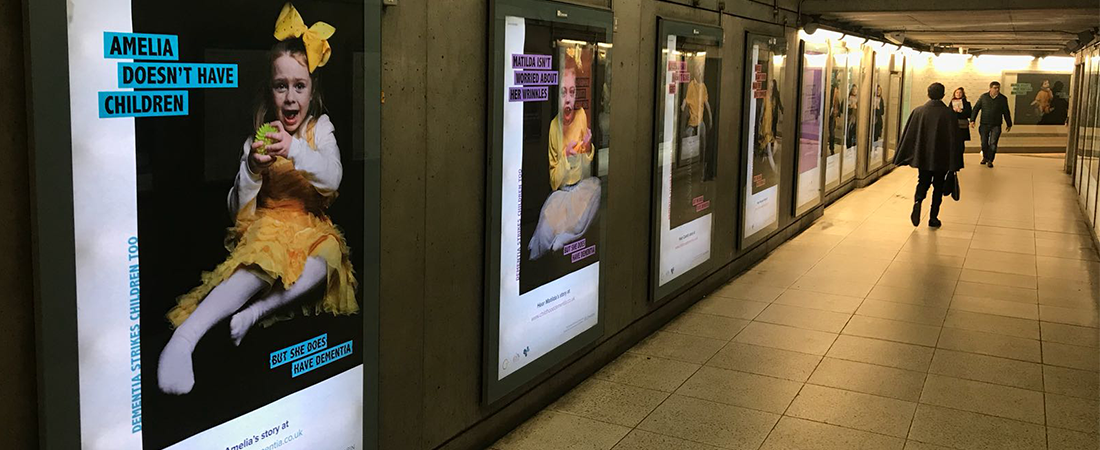Campaign photography of six children living with childhood dementia is dominating the advertising space at Westminster underground station in London, and will remain there for two weeks as part of the disease awareness campaign Dementia Strikes Children Too.
If you’ve never heard of childhood dementia, you’re not alone. Childhood dementia exists – but people often haven’t heard of the disease, which is normally associated with adults.1 The striking underground posters, created by Portland and rare disease photographer Same But Different, display a contrast between elderly adults and the very young children who feature as part of the campaign, drawing on the insight that most people aren’t even aware that children can get dementia.

Parents and families affected by childhood dementia are robbed of many joys of everyday life with their children; having to witness their child’s rapid decline is extremely distressing for parents and family members.
The community-driven campaign has been co-developed by families and three patient support organisations, with the support of biopharmaceutical company BioMarin, in order to help share the stories of real children living with this group of ultra-rare diseases. Viewers are directed to a central online hub, https://childhooddeme.wpengine.com/, housing video stories, educational content and the opportunity to share the campaign with local MPs on social channels.
Portland worked with BioMarin and this wider patient community to develop the photography-led campaign, which has launched to help raise awareness of dementia in children and targets policymakers to drive change.

Several different groups of neurological diseases cause dementia in children,2 but there is little research into the prevalence of all of these different forms of childhood dementia in the UK, so the total number of children affected by these diseases remains an estimate.
Therefore, the campaign also calls for better clinical education of this group of ultra-rare diseases and action to put in place the systems and tools for earlier diagnosis.
Professor Paul Gissen, Consultant in Inherited Metabolic Diseases at Great Ormond Street Hospital (GOSH) and Head of Genetics and Genomic Medicine programme at UCL Great Ormond Street Institute of Child Health (ICH) said: “When we think of dementia we usually think of older people but it is much less well known that dementia can also affect young people. Often these children have rare neurological conditions caused by genetic faults, such as Batten Disease and Niemann-Pick Syndrome.
“Research into how to identify children with these conditions is vitally important as delayed diagnosis can cause irreversible brain damage. At GOSH and ICH we are working with collaborators across the world on research into Niemann-Pick, Batten Disease and mucopolysaccharidoses. We are hopeful that with this research we can help diagnose and treat children with dementia and ultimately improve the lives of the families who live with these distressing and debilitating conditions.”
Alex Sobel MP, officer of the APPG for Rare, Genetic and Undiagnosed Conditions, and whose constituent in Leeds features as part of the campaign, said, “I am pleased to support the Dementia Strikes Children Too campaign. Childhood dementia is a shocking group of neurological diseases, and I am saddened to hear of the challenges faced by families. That is why I am calling for steps to be taken to ensure greater clinical education and earlier diagnosis of childhood dementia.”
A broader online content campaign will be driven by the families and expert patient organisations using the dedicated campaign website and a coordinated social media effort to raise awareness to the public – culminating in a launch event in Parliament in May. Visit the website and find out more here.
- YouGov, MP Survey, January 2018. Data on file.
- Lutan, C. and Greenop, C. Creating a framework for Diagnosis, Care and Treatment for Childhood Dementia, Expert Group Report, 2016

